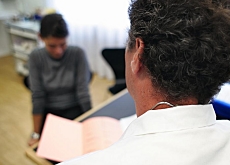Return of syphilis prompts government action

Switzerland is to set up a national centre for sexually transmitted infections (STIs) following a marked increase in cases over the past few years.
Earlier this year syphilis was reinstated on the list of notifiable diseases. Other STIs, such as gonorrhoea and chlamydia, are rising steadily after being in decline for much of the 1990s.
“We are not surprised by the increase because similar patterns have been observed in other countries. But maybe the size of the increase is a bit surprising,” Karim Boubaker, head of infectious diseases at the Federal Health Office, told swissinfo.
As a result, the health office is to set up a national centre for STIs later this year, whose first job will be to improve the system for monitoring sexually transmitted diseases in Switzerland.
Boubaker says the next step will be to come up with new safe sex messages targeted at specific risk groups, work that will be carried out in conjunction with the national Aids campaign.
“It’s difficult to interpret why people are not protecting themselves but I think many people either think these diseases have gone away or they know they can be treated,” added Boubaker.
According to Federal Health Office figures, the number of syphilis cases fell continually from 1987-1997, and as a result it was struck from the country’s list of notifiable diseases in 1999.
But continued monitoring by dermatology clinics over the past seven years shows that syphilis has since made a comeback, notably in Zurich and Geneva.
Mandatory notification
Since laboratories and doctors were once again ordered to report all syphilis cases in February at least 90 have been reported – almost four times the total for the whole of 1997. Boubaker cautioned that the 2006 figures were only estimates and would not be fully analysed until the end of the year.
Doctors have also been told to notify the authorities of all incidence of gonorrhoea. Boubaker said a particular concern was the emergence of antibiotic-resistant strains of gonorrhoea in the Geneva area.
Professor Vincent Piguet, who recently published a study on the rise of STIs in Geneva, told swissinfo that the re-emergence of syphilis and other diseases was a “public health concern”.
“Syphilis is clearly a disease you want to treat early because it can cause long-term skin damage, neurological complications as well as cardiac complications,” said Piguet, who works in the department of dermatology and venereology at Geneva University Hospital. “In newborns, congenital syphilis can cause bone damage, neurological complications and even death.”
He said a return to unsafe sexual behaviour by both the homosexual and heterosexual populations was behind the increase in STI cases.
Syphilis cases
In 2004 – the latest year for which figures are available – the hospital’s dermatology department registered 24 cases of syphilis, almost five times the figure recorded six years earlier. Piguet says the situation now appears to have stabilised in Geneva, albeit at a higher level than in the past.
Similar sustained increases have also been seen with gonorrhoea and chlamydia, which can both cause sterility in women. According to health office figures, gonorrhoea rates more than doubled in Switzerland between 1997 and 2003, climbing from 269 to 531 cases.
Figures for chlamydia for 1999-2003 show an increase of 64 per cent, from 2,135 to 3,494 cases. But the true prevalence of STIs in Switzerland is likely to be much higher.
Piguet says this is because not all cases are reported and symptoms, which in some cases are relatively mild, are not always identified. “The scale of the problem is probably far worse than the figures show,” he said.
In a 2005 study of STIs in Switzerland, Stephan Lautenschlager, a doctor at Zurich’s Triemli Hospital, noted that increased awareness of the symptoms and signs of acute syphilis infection was needed since few general practitioners had dealt with cases.
swissinfo, Adam Beaumont in Geneva
Recent trends in western Europe and the United States show an increase in sexually transmitted infections (STIs) over the past decade, according to the Federal Health Office.
Data collected from different sources between 1997 and 2003 confirmed this trend in Switzerland. Since 2000, there has been a steady increase in cases of syphilis, gonorrhoea and chlamydia.
Separate Swiss studies point to higher risk-taking behaviour among the sexually active population for the rise in STIs.
According to the Federal Health Office:
Syphilis cases rose by 127% from 1997-2003.
Gonorrhoea cases rose by 97% from 1997-2003.
Chlamydia cases rose by 64% from 1999-2003.

In compliance with the JTI standards
More: SWI swissinfo.ch certified by the Journalism Trust Initiative


You can find an overview of ongoing debates with our journalists here. Please join us!
If you want to start a conversation about a topic raised in this article or want to report factual errors, email us at english@swissinfo.ch.